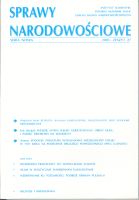Problematyka narodowościowa Bułgarii w XX wieku
Bulgaria's Nationality Problems in the 20th Century
Author(s): Piotr EberhardtSubject(s): Cultural Essay, Political Essay, Societal Essay
Published by: Instytut Slawistyki Polskiej Akademii Nauk
Keywords: Bulgaria - demography; nationalities;
Summary/Abstract: The first part of the article presents the historical context for the shaping of ethnic relations in the territory of contemporary Bulgaria. A statistical analysis of the ethnic composition of Bulgaria from the period of 1900 to 2001 demonstrates that, at the beginning of the 20th century, some 80 percent of the population of this country were ethnic Bulgarians. The most numerous minority were Muslim Turks. Despite massive political and demographic-social transformations, the numerical proportions of Bulgars and Turks have not change dramatically. The central section of the article takes a historical approach to the situation in Bulgaria in the interwar period, during World War Two, and in the Communist times. On the basis of statistical data from consecutive censuses, the evolution of the nation's ethnic structure is examined, with particular attention devoted to the issue of Macedonians and the so-called Pomacy – Muslims who speak the Bulgarian language. The conflict between Bulgarian authorities and the Turkish population in the 1980s is also discussed. The main part of the study discusses the ethnic situation of contemporary Bulgaria. Conclusions are based on the census of 2001, which surveyed nationality, language, and religion and presents a breakdown of the ethnic composition of Bulgaria's population. There are separate analyses for the entire country and for its 28 individual counties, which clearly illustrate the numbers and distribution of the ethnic Bulgarian population as well as the country's major national minorities (Turks, Pomacy, and Roma).
Journal: Sprawy Narodowościowe
- Issue Year: 2005
- Issue No: 27
- Page Range: 53-70
- Page Count: 18
- Language: Polish

